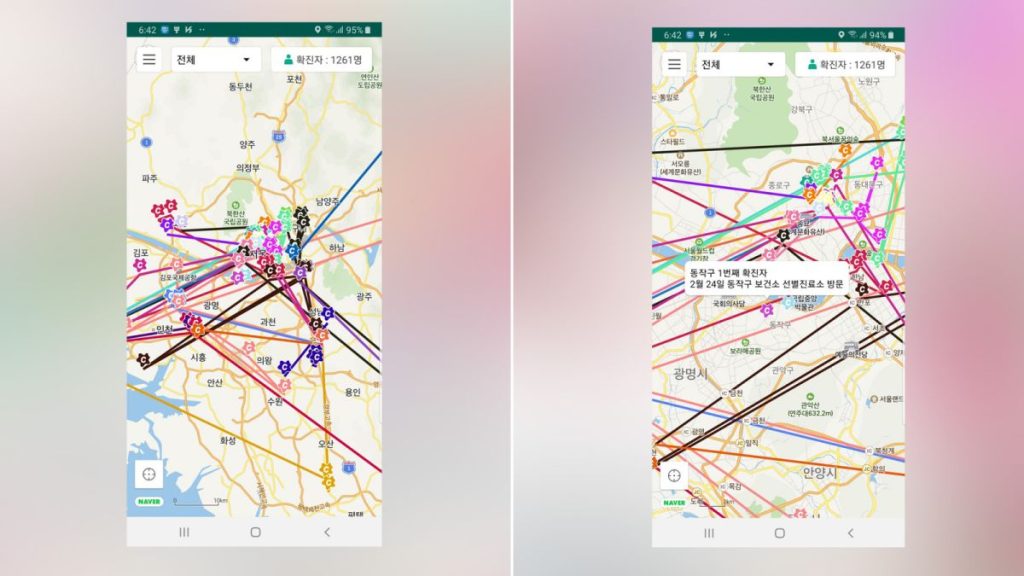The Coronavirus pandemic has brought the World to its knees quite literally, Kenya included. The virus might have a low mortality rate but it’s spreading like wildfire with the potential of shutting down economies.
As you’re reading this, the number of COVID-19 cases around the world keeps growing and governments all over are getting desperate as they seek to find ways to control the situation.
One of the most echoed recommendations is for people to keep socially distant and work from home if they can. This is because people don’t really know when they come into contact with an infected person and that poses a great risk.
However, in their desperation, governments have turned to the use of location data and other measures that normally would be considered an invasion of privacy. To, at least, try and minimise the spread of the virus.
South Korea
South Korea has been able to reduce their daily infection rate from a high of 909 new cases in one day to around 74 in a day.
Their “success” (for lack of a better description), has been attributed to a set of tracking mechanisms. The tracking has enabled the government to retrace the steps of those infected and consequently reduce the chances of others getting infected.
The South Korean government resulted in using tracking measures after lessons learnt from the MERS (Middle East Respiratory Syndrome) pandemic a few years back. When MERS hit South Korea, the country was able to contain the deadly disease in just under two months thanks to a set of tracking technologies.
These technologies are what have, again, come to the rescue with COVID-19. South Korea uses a set of data; phone tracking, credit card tracking and use of surveillance cameras to trace the whereabouts of those who have already been infected.


Screenshots of a Coronavirus map tracker in South Korea | Image Courtesy CNN
This has helped the country find people who came into contact with those infected and take steps to mitigate the situation.
On top of this, South Korea launched an app (in early March) to further strengthen the fight against Coronavirus. The app tracks the movements of those instructed to quarantine, to ensure that they do not violate this. Secondly, it alerts users if they are within 100m of a location where an infected person was.
Israel
It’s not just the Koreans, Israel has also resulted in using location data to fight the virus. Their methods may not be as extensive as South Korea but they too retrace the movements of those infected to find anyone that they may have come into contact with.
Israel takes it a little further by texting those they suspect may have come into contact with an infected person and asking them to self-quarantine. They then use location data to ensure that those instructed to self-quarantine do so, failure to which they get arrested.
People tend to be very selfish and inconsiderate and if this is going to help with enforcing quarantine then so be it…
What Kenya Can Do
From various online polls, we ran on our social media platforms, 48% of respondents said that they were okay with the government using location data to combat the spread of the virus.
“People tend to be very selfish and inconsiderate and if this is going to help with enforcing quarantine then so be it,” said one respondent.
Borrowing from South Korea and Israel, Kenya could as well use the location history of those infected to trace the people who came into contact with them.
Like South Korea, the government could also provide information through real-time alerts on the number of ongoing cases and also red alerts if someone comes close to an area known to have been visited by a victim.
Despite these options, the Kenyan government seems to be mark-timing with the handling of the virus with current measures not enough to really stop the virus from spreading. However, there’s another case as to why the government should not use location data.
Data Privacy
From our poll, 24% of respondents outrightly said no to the idea, citing privacy issues as their reason. Another 28%, interestingly, were open to the idea but expressed their concern as to how the government would handle the data after it is collected.
Clearly there’s a distrust in the government. From the handling of such personal data to a belief that Coronavirus is a tale by the government to instil fear on people.
“I think privacy is not that important now,” read another response from our poll.
In South Korea, their government says that they do not share identifiable information on their system. It only displays the gender, age bracket and case number of infected persons.
Israel also claims that it does not collect personally identifiable information and the agency in charge of combating the spread of Coronavirus was only granted 30 days to use this location data.
While in Kenya we may have a data protection law in place, such extreme measures would definitely cause some uproar from the population if our poll is anything to go by.
Which side are you on? Should the government use location data to fight against the spread of Coronavirus?





Comments